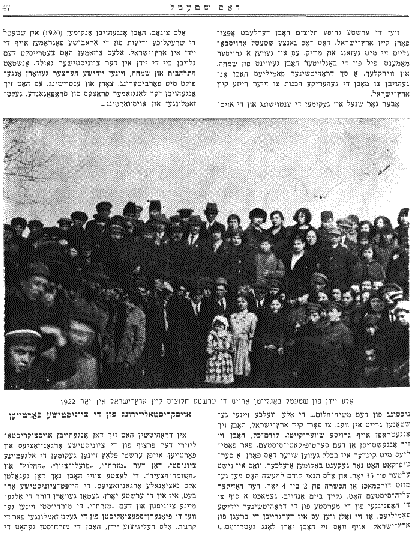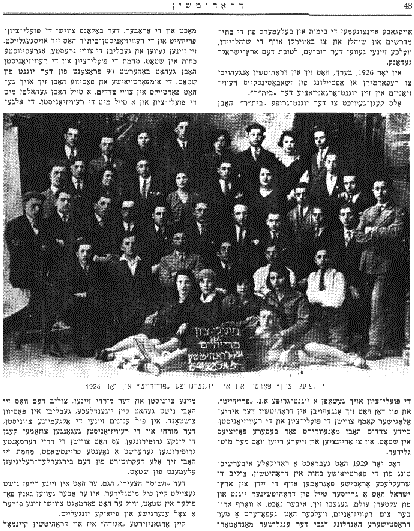Previous Page
|
Next Page
 [
Page 47
]
[
Page 47
]
When the first group of
pioneers set off for the Land of Israel, the entire town turned out to
accompany them with music and song. It was a great moment. Many of the
participants were crying from joy, and many Drohitchin families actually
started preparing to move to Palestine.
[Photo:] All the Jews in town
accompanied the first pioneers on their way to Palestine in 1922.
However, disappointment and
emptiness of the messianic dream set in very quickly. Everyone who was prepared
to go to Palestine faced great hardships. First of all, they were disappointed
by the certificate system that authorized entry into Palestine. Also, it became
difficult for families with children to travel. Certificates were made
available only to people younger than 35, and the candidate had to promise to
undergo training for 2 to 4 years in advance. That immigration system
immediately dashed the hopes of most of the Drohitchin Jewish families who had
long dreamed of reaching the borders of the Land of Israel.
In addition, the terrible news
about the Arab pogroms against Jews in Palestine reached Drohitchin, and belief
in the Zionist redemption was badly shaken. Instead of excitement and joy, Jews
were filled with bitterness, rage and disappointment. The slow process of
propaganda, fundraising and anticipation began.
The growth of Zionist parties
Zionist organizations and parties began to develop in Drohitchin. The first
groups were the General Zionists, the religious Zionists [Mizrachi], Poalei
Zion [Workers of Zion], Hechalutz [Pioneers] and Hashomer Hatza'ir [Young
Guard]. The last two groups operated as national organizations. In the early
years, principal Zionist activity was undertaken through the General Zionists
and Mizrachi. The Mizrachists were the pioneering experts in fundraising for
the various funds. As religious Jews, the Mizrachists
 [
Page 48
]
[
Page 48
]
had the task of standing up in the synagogues and convince the synagogue-going
Jews (who were the majority) to contribute money for the Zionist project.
In approximately 1926, a branch
of Jabotinsky's Revisionist Zionists opened in Drohitchin, together with its
youth arm, Betar. To offset the Betar youth group, the Poalei Zion created its
own group, called Freiheit [Freedom]. From then on, the ideological battle
between the Poalei Zion and the Revisionists began, with both sides maneuvering
for the best positions in town, and seeking to increase their memberships as
much as possible.
[Photo:] The Poalei Zion Party and the Freiheit youth group in 1928.
There was a radical shift of
party power in Drohitchin in 1929. Due to the awful Arab pogroms against Jews
in Palestine, a large number of Drohitchin young people and adults over night
switched allegiance to the Revisionists, who advocated a much more drastic
approach to the British mandatory government and the Arabs. The balance between
the Poalei Zion-Freiheit and the Revisionists-Betar became equalized. The two
groups remained the two largest and aggressive forces in town, and the Poalei
Zion and Revisionists had the allegiance of 90 percent of the youth in
Drohitchin. The politically unaffiliated and inactive Jews also joined up with
the two groups. Some joined the Poalei Zion, and others joined the
Revisionists. The General Zionists and Mizrachi, because they had no youth
wing, remained passive. In many areas, the General Zionists, Mizrachi and
Revisionists joined together against the left-wing groups; there were friendly
relations among these three groups, and they sought recruits among the same
religious element in town.
The Hashomer Hatsa'ir didn't
have many members, but it was very popular in town anyway, because it had very
energetic and fiery young people. There was never a group of the anti-Zionist
Agudath Israel in Drohitchin.
Previous Page
|
Next Page
This material is made available by JewishGen, Inc.
and the Yizkor Book Project for the purpose of
fulfilling our
mission of disseminating information about the Holocaust and
destroyed Jewish communities.
This material may not be copied,
sold or bartered without JewishGen, Inc.'s permission. Rights may be
reserved by the copyright holder.
JewishGen, Inc. makes no representations regarding the accuracy of
the translation. The reader may wish to refer to the original material
for verification.
JewishGen is not responsible for inaccuracies or omissions in the original work and cannot rewrite or edit the text to correct inaccuracies and/or omissions.
Our mission is to produce a translation of the original work and we cannot verify the accuracy of statements or alter facts cited.
 Drogichin, Belarus
Drogichin, Belarus
 Yizkor Book Project
Yizkor Book Project
 JewishGen Home Page
JewishGen Home Page
Yizkor Book Director, Lance Ackerfeld
This web page created by Lance Ackerfeld
Copyright © 1999-2025 by JewishGen, Inc.
Updated 7 Dec 2001 by LA
 [
Page 47
]
[
Page 47
]



